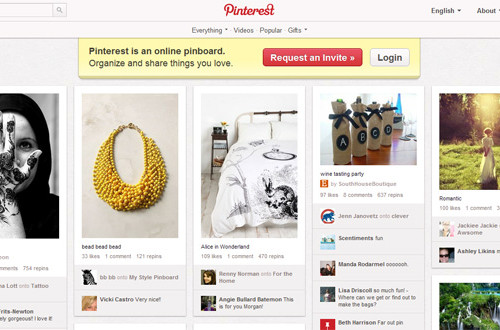Valued at more than $1bn in the US and still growing, according to Comscore figures from March, at a rate of 145% since the start of 2012, it’s easy to see why marketers are seeking to capitalise on a new social sharing channel such as Pinterest. This adoption is even visible from looking at how the site has grown in the UK – its user base more split evenly between male and female; its content much more based on sharing venture capital, blogging resources and, tellingly, web stats, than the female oriented crafts, gifts, hobbies and leisure pins commonly displayed in the US. Add to this Instagram’s $1bn acquisition by Facebook and we can identify a new and booming visual economy, which will be driven onward by brands looking to engage with consumers and their passions.
The emergence of these sites puts the unattainable within reach – they enable far broader exposure to brands, in particular high-end prestige luxury items. Not every Pinterest user would go out and buy a premium magazine to make these discoveries themselves, for example. The ability to share these items with their friends allows users to align and express themselves with an aspirational ‘online avatar’ version of themselves, in a way that hasn’t been possible up to now. The question then becomes one of online identity – the personal brand vs. the reality, which may be somewhat distant.
However, the curation of social content is unlikely to replace a physical drive for sales and ownership as a status symbol for premium brands using these media. Linking online engagement to real world sales remains a challenge. Justifying ROI in this area may prove a particular niggle unless objectives are focused on brand recognition and engagement, rather than hard sales targets. However, by curating images of brands and products on sites like Pinterest and Instagram companies can create an association and help to shape an individuals’ personal brand by affiliation. Individuals can align themselves with certain aspects of a brand, its DNA and opinions, in a visually engaging manner. The best examples are branded content – but in bitesize chunks.
Brands that recognise the value of engagement and interaction with their audiences do well here. Gamification can also play a part in making sites such as Pinterest more engaging and interactive, such as bmi’s Pinterest lottery and Kotex’s Inspiration Day campaign. But it’s easy, if a company is not honest or realistic about what its brand means to people, to fall into the eagerness trap – “it’s new and it’s shiny and it’s popular, we should do it”. Sharing and social media sites are not a natural fit for all brands – we’ve all seen campaigns shoe-horned into a format which can turn users off. Companies have to accept that in our digital, social world, they are less in control of their brands and their online exposure and so managing it needs careful consideration.
Brands need to be honest with themselves about who they are and what they stand for; and careful about how they break these dynamics and communicate their many different aspects through a single channel. Savvy brands can steal a march – like Channel 4, who allow viewers to break down their content into chunks to be shared in their own ‘scrapbooks’, allowing people to cherry pick and disseminate what they feel to be the best Channel 4 recipes, how tos, and scenes from favourite dramas.This kind of association can tie more readily to specific purchase decisions: Delia mentions an ingredient on her shows, and it sells out in supermarkets the next day. We expect to see companies start to maximise and monetise this communication, particularly where it becomes acceptable for a business to interact with users directly: if it adds value to rather than interrupts the user experience. Understanding that a brand is no longer created and developed in a single dimension is crucial – in many ways your brand is becoming what your consumers tell you it is, not the other way round. Social sharing and the visual economy will accelerate that shift.






